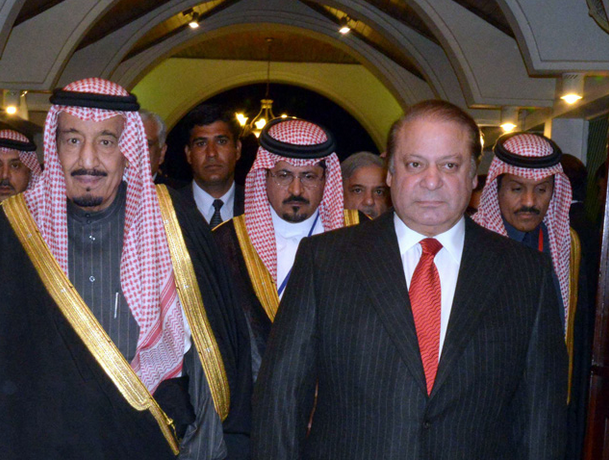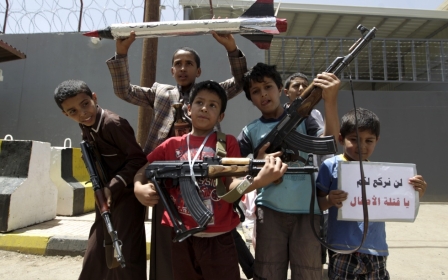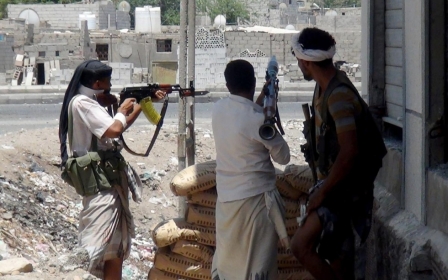Pakistani-Saudi ties, Yemen and 'political blackmail'

In the last couple of months, the normally friendly countries of Pakistan and Saudi Arabia have been at serious odds with each other. Unpleasant relations are unusual for the two countries – Saudi Arabia is the sanctuary of Islam's holiest sites and Pakistan, a country embedded in the tenets of Muslim nationalism, is home to many who consider the kingdom a parent country.
In 2010, a Wikileaks cable revealed the extent of Saudi influence in Pakistan: the Saudi ambassador to the US, Adel al-Jubeir (who was a close confidant of King Abdullah) is reported to have said that the Saudis were not mere observers but “active participants” in Pakistani politics.
However, the friendship between the two countries has been fairly toxic as well, and the kingdom's recent request for ground military support in Yemen is typical of its inconsiderate demands from its strategic partner. Though the Pakistani parliament has only agreed to provide peaceful “diplomatic” assistance and help in the imposition of an arms embargo, the very nature of these demands and the retaliatory threats made by the Gulf Cooperation Committee (GCC) have exposed the political blackmail behind the “unity” that binds Riyadh and Islamabad.
Moreover, given how spurious the Kingdom's war-mongering has been (seemingly indulgent yet confused), one must question why Saudi Arabia insisted on a diplomatic uproar with Pakistan just days before the war was “won” and a subsequent ceasefire announced (only to be revoked a few hours later)? Do Saudi Arabia and the GCC even have a clear strategy of which Pakistan can be a part? Does the Pakistani parliament's decision to stay neutral somehow reflect a broader lack of conviction?
Sending troops to fight a war that is widely perceived by Pakistani Shiites as anti-Iran/anti-Shiite (rather than pro-Yemen) would have put Pakistan - a country already torn apart by religious extremism - at risk of further sectarian conflicts. It could have also threatened the unity of its armed forces, which are already deployed in a delicate military effort against extremist outfits at home.
A history of stoking sectarianism
This is not the first time Saudi Arabia has been oblivious to Pakistan's domestic priorities. In the ‘80s, private donations from Saudi Arabia started pouring into seminaries in Pakistan. As pointed out by Oxford Islamic Studies, a vast number of these privately managed schools (known as madrassas in the local vernacular) provided a base for “an independent and often oppositional role by the religious establishment” and became the breeding grounds for sectarian violence.
These seminaries still act as recruiting schools for militias bearing an ideological slant that is aligned with Saudi national interests. Pakistan also allowed these seminaries to function in the hope that they would produce an armed resistance that would deliver the country’s interests in the disputed region of Kashmir. Today, the unforeseen consequences of such policies still haunt Pakistan, a country ravaged by decades of religious extremism.
By proliferating Sunni Wahhabism - a rigid and austere interpretation of Islam - Saudi Arabia has tried to isolate Iran and contain the rise of Shiite fundamentalism in the Middle East. On the other hand, it has spelled disaster for Pakistan. These “educational” facilities have caused havoc in Pakistan, which is home to an estimated 30 million Shiite Muslims (20 percent of the population) who are routinely targeted by Sunni militant groups. Their plight is ignored by both Pakistan and Saudi Arabia.
The Shiite-Sunni rift in Pakistan has seen dramatic escalations since the ‘90s when Pakistani PM Nawaz Sharif led his first term. By talking about rooting out sectarian violence in one place and promoting it in another, Sharif could lose the confidence of Pakistan’s largest minority.
Saudi seems to be incognisant (or wilfully ignorant) of the sectarian tensions inside Pakistan. Any involvement in the Yemen conflict has the potential to exacerbate Pakistan's sectarian conflicts because the kingdom's “confrontation” with Shiite Houthi rebels reeks of sectarian overtones.
Divisions within military
The composition of the Pakistani military is reflective of the above-mentioned demographics: roughly 70 percent Sunni and 30 percent Shiite. A significant number of soldiers are recruited from the rural districts of southern Punjab - a hotbed of sectarian tensions. Pressuring the army to send troops abroad would not only be a stretch of its resources (which would mean a greater strain on state resources, a bigger slice of the budget and hence an even larger political role for the military) but it would also put the army at risk of internal divisions.
The army maintains stability by adopting the grander narrative of nationalism because ethnic and sectarian differences can jeopardise the unity (and thus, the discipline) of its soldiers. Ethnic bias due to Punjabi dominance in the Pakistani military is already a huge issue. The “military presence” in the downtrodden and increasingly separatist province of Balochistan is considered by many critics to be a full-blown Punjabi occupation. With Shiites being routinely targeted by extremist groups at home, the Pakistani military needs to snuff out sectarian biases from its own ranks instead of being employed as a mercenary force by a country that promotes them.
Moreover, if Saudi Arabia deemed Pakistani Shiite soldiers untrustworthy in a fight against the Shiite Houthis, then Pakistan would have to deny deployment to 25 percent of its soldiers, who would then be discriminated against based on their religious beliefs. Who would take up the task of convincing Pakistani Shiites that their country was not fighting a sectarian war?
Another proxy war
Turning Pakistan into the site of yet another proxy war and exacerbating its social tensions cannot be considered a friendly move. So, apart from an unhealthy dependency on Saudi cash, what has Pakistan gained from this “friendship”?
In a scathing article, Ahmad Al Jarallah, the editor-in-chief of the Kuwaiti daily Al-Siyassa, writes that Gulf countries provide assistance “merely to help quell rampant extremism and to help Islamabad overcome poverty which has contributed to the emergence of terrorist groups that are a strategic threat to the Gulf and Islamic security”.
The above quote seems to expose the GCC's confused policies in Pakistan. The idea that “terrorism” in Pakistan can be eradicated through the enhancement of economic life is a slightly delusional one. Though there is an element of truth in the idea that material poverty - especially within Pakistan's crude power structures - can instil a somewhat misguided revolutionary spirit in its bitterly poor citizens, this analysis is worthless without a serious condemnation of Saudi political interventions in the country.
Alongside financial donations, Saudi Arabia has endorsed brutal state power (in terms of dictatorships and draconian government policies), harsh neoliberal policies and a hegemonic brand of Islam that works for the kingdom's own national interests but proliferates dangerous and nihilistic interpretations of political Islam that in turn misguide the revolutionary impulse of the Pakistani underclasses.
This is not to say that the decision to stay out of Yemen is a no-brainer or that Pakistan will not have to face dire consequences at home and abroad for its non-compliance. At home, Pakistan might actually see a spike in sectarian violence.
Far-right religious groups have historically enjoyed a certain level of state support, which is why their influence goes deep inside Pakistan's social structures. The country is prone to fanatical vigilantism, especially when the state tries to deviate from the dominant religious narratives that undermine the power of religious groups.
To assert its dignity in the international arena, Pakistan needs to work hard and intelligently. This is the country's first dealing with the new ruler of an old ally country. A schism between the two countries is bound to have unpredictable consequences, because Pakistan does not have much diplomatic experience with King Salman's regime. The outcome of this row could instigate a huge shift in the kingdom's foreign policy towards Pakistan, leaving the weak country more isolated than ever before. This is precisely why declarations of an almost spiritual symbiosis with Saudi Arabia is employed in the parliamentary resolution.
Sharif's debt to Saudi
Furthermore, Pakistan is risking the cash it receives from Saudi Arabia, which it requires quite often in order to avoid economic meltdown. Last year, the Saudis gave Pakistan $1.5bn as an “unconditional gift”. Even more importantly, this is a leadership test for Prime Minister Sharif. Saudi Arabia negotiated Sharif's release and gave him refuge after he was overthrown in a 1999 military coup. He owes the kingdom a lot more than his country can afford. He will have to prove that he can prioritise the political over the personal. However, he seems to be conceding ground by negotiating a “cleric” exchange between Pakistan and Saudi. Of course, the idea behind such “reconciliatory” moves is to minimise any cultural, historical or social distinctions between the two countries and re-establish “unity of fate” through unity of faith.
Refusing to fight for the Saudis in Yemen might have unpleasant consequences for Pakistan in the short term, but in the long run a decision to not use state resources to kill Yemini Shiites (while Shiites at home are killed without protection) is bound to be less catastrophic (and morally upright), especially because Pakistan is still struggling to find an inclusive and communal identity.
To entertain demands with such grave implications would have required a lack of dignity on Pakistan's part but, having finally asserted a sense of domestic self-awareness - even if it is not for all the reasons mentioned above, the Pakistani parliament has initiated a much needed re-evaluation of a controversial friendship.
New MEE newsletter: Jerusalem Dispatch
Sign up to get the latest insights and analysis on Israel-Palestine, alongside Turkey Unpacked and other MEE newsletters
Middle East Eye delivers independent and unrivalled coverage and analysis of the Middle East, North Africa and beyond. To learn more about republishing this content and the associated fees, please fill out this form. More about MEE can be found here.





